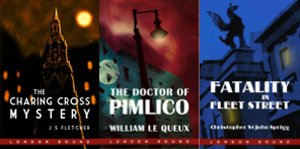 Agatha Christie, Margery Allingham, Ngaio Marsh, Dorothy L Sayers – just a handful of the best-known names from the Golden Age of crime fiction back in the 1920s and 30s. In those days, detectives had something proper about them, there was a certainness about right and wrong, and crime fiction was maturing into a widely-loved genre. Now, Oleander Press is hoping to bring a few of the lost gems of that era to new audiences with London Bound, a series of freshly re-printed Golden Age crime novels, all set in the capital.
Agatha Christie, Margery Allingham, Ngaio Marsh, Dorothy L Sayers – just a handful of the best-known names from the Golden Age of crime fiction back in the 1920s and 30s. In those days, detectives had something proper about them, there was a certainness about right and wrong, and crime fiction was maturing into a widely-loved genre. Now, Oleander Press is hoping to bring a few of the lost gems of that era to new audiences with London Bound, a series of freshly re-printed Golden Age crime novels, all set in the capital.
The first to be released is The Charing Cross Mystery by JS Fletcher. Set in the 1920s, it sees a young barrister trying to solve a mystery that begins with a fatality on a train across London. On 15 April, William le Quaux’s The Doctor of Pimlico comes out, and it will be followed in June with Fatality in Fleet Street by Christopher St John Sprigg. Further titles will include Henry Holt’s The Mayfair Mystery, and Malcolm Sage, Detective by HG Jenkins. Thrilling tales, amatuer sleuths, heinous crimes, and a charming bygone setting – the series appears to have it all if you’re a cosy or Golden Age crime reader.
London Bound will see 10 releases in total, and is being edited by Cambridge bookseller Richard Reynolds, who is also chair of the CWA’s Gold Dagger judging committee. He believes there’s a rich seam of detective stories to be discovered, and that there are plenty of readers out there who are interested in them. “The continued popularity of Golden Age authors evidences a nostalgia for those days of the country-house parties, where whimsical guests harboured hidden agendas, passed cryptic messages then presented perfect alibis when a knife under the dining-room table is found protruding from the back of the maid!” he says.
By reading them, you’ll be transported back to a period that has some resonance with our current times, and the context within which they were written is fascinating. “After the carnage and horrors of WWI, a sense of fair play in the detective novel prevailed allowing readers to momentarily escape from present realities, writers endeavouring to create an artificial world by penning stories with minimal violence and clever plots, order being restored to the community or village by an honourable detective and the perpetrator receiving their just deserts,” adds Reynolds. “This is as valid today as it ever was for those wishing a temporary respite from world or domestic events, or even as an avoidance from the necessary chores of everyday life.”
The books have been newly typeset, and come with special French flap covers. The covers have been designed afresh in period style by Ayshea Carter, graphic designer at the Fitzwilliam Museum.
For more information, visit the Oleander website here.









Thanks for the update. I’ll definitely be checking these out.
Great to see Ngaio Marsh mentioned – we have a brand new Facebook page (as of a week ago) if anyone would like to have a look and hopefully give us a ‘Like’.
Thanks.
https://www.facebook.com/NgaioMarshHouse